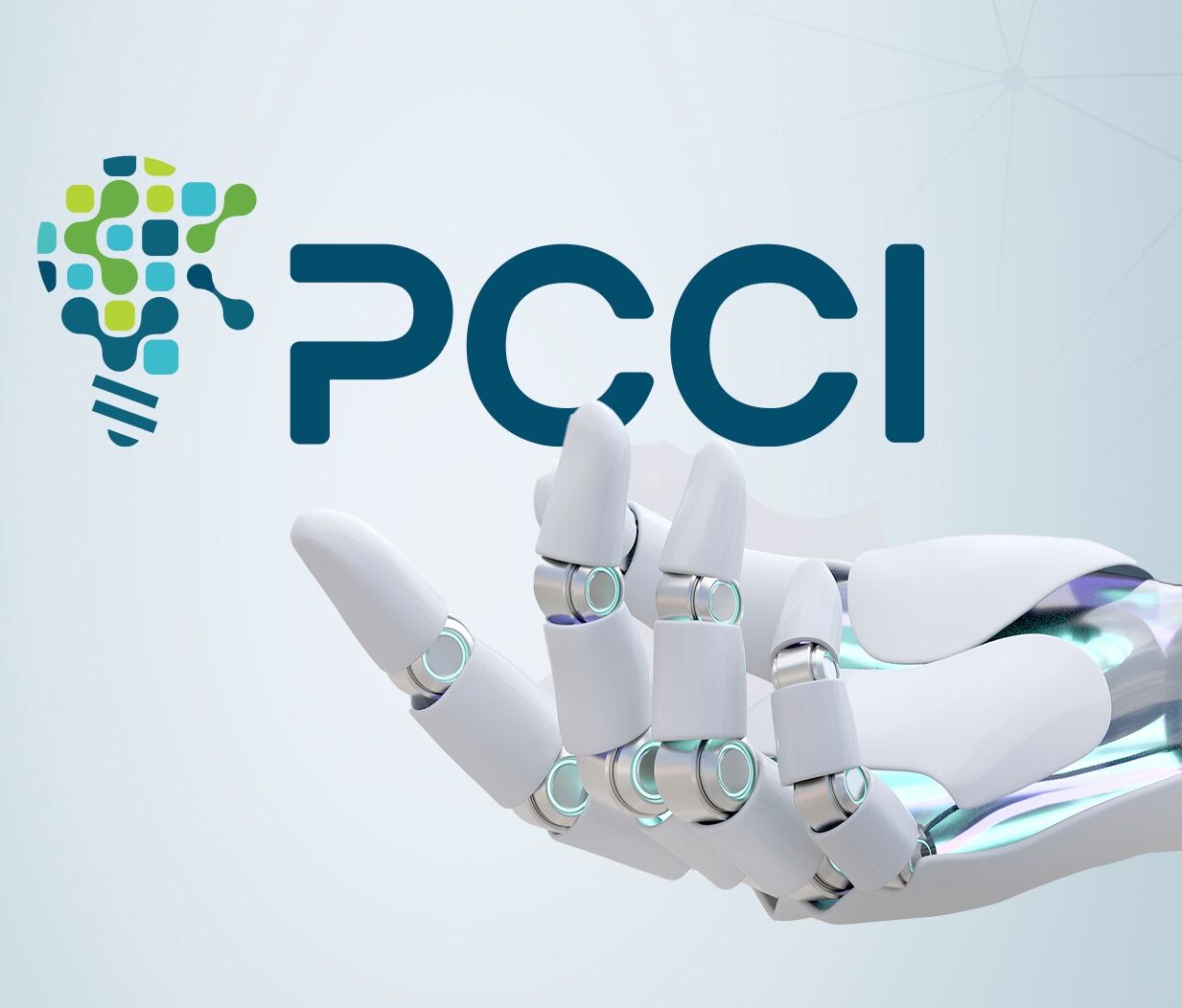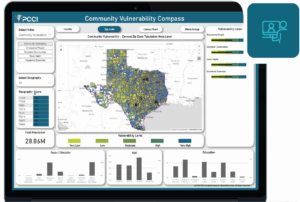
AI Is Working For Us Now, Helping Us Heal and Prevent Harm
By Steve Miff, PhD, President & CEO of PCCI
We can’t let artificial intelligence (AI) continue to be defined by science fiction, deep fakes, and plagiarized term papers, because today―right now― responsible uses of AI in medical care are helping prevent harm, improve clinical decisions, and reduce costs of care. Is there too much unjustified hype and exuberance over AI? Absolutely! Are there unsubstantiated claims and sometimes dangerous promises? Unfortunately, yes. However, there are also many examples of ethical, responsible and equitable uses of AI that are streamlining operations, improving efficiencies, and yes, even helping physicians and clinical teams augment their insights and expertise to save lives.
AI is also not new. While the history of artificial intelligence (AI) can be traced to antiquity hypothesized by master craftsmen, modern AI really started with the invention of the programmable digital computer based on mathematical reasoning in the 1940s. In the last decade, the true potential (and risk) of AI and Machine Learning algorithms have accelerated and can simply be classified into predictive, prescriptive and generative AI/ML, with the latter creating the most excitement and controversy over the last 12-24 months.
At PCCI, we have been researching, developing, deploying and testing applications of AI and machine learning for a decade with a focus on applying these innovative concepts to those who serve the most vulnerable individuals and communities. With every project that we’ve embarked on, we’ve followed sound scientific principles and a prescriptive approach to development, testing and implementation that keeps the clinician in full control and with the utmost transparency, and the patient at the center. While the AI part is sexy, the governance, processes, and discipline you put around it makes it reliable, responsible and effective. We developed and optimized our own processes over type and rely on a core set of core principles:
- There needs to be a clearly articulated problem and need that the AI is trying to solve/augment. If you don’t have a real problem to solve, it’s just cool math.
- A multi-disciplinary team that includes an engaged and passionate lead clinician is required from day 1. The front-line staff already have the knowledge and intuition of what is needed and what could work.
- More than half the time is spent on ensuring data quality and staging – researching, curating, studying, aggregating, ingesting, validating, augmenting and analyzing data from multiple sources is the lifeblood of any successful model. The old saying of “junk in, junk out” is even more crucial with AI.
- Focus just the data required for the initial development, but understanding the required data latency, refresh frequency, storage and compute requirements to understand deployment requirement and cost to operationalize and sustain.
- You need your own AI sandbox and your EHR is not it. PCCI developed Isthmus™, a secure, digital data environment leveraging established cloud technology and optimizing open-source tolls for end-to-end, secure data orchestration, modeling and deployment.
- Data security is paramount, hence why PCCI deploys Isthmus™ within the firewalls of a health system/payer/provider (no protective data is moving out)
- There is a prescriptive stage-gate development and deployment process that requires patience and time:
- Build models leveraging historical data; T
- Test the preferred model with a reserved data set
- Optimize the performance of the model leveraging clinician input to optimize how the model is to perform and be used in practice
- Deploy the model with real-time data and run it silent mode. No decisions are made using the model, but the performance, stability, expected output is evaluated and monitored. Evaluate for equity and expected performance on the respective patient population. This could take months, or years. If you’re trying to predict a rare event, it will require extensive time to ensure adequate amount of time and data is being processed. To ensure proper evaluation for the PCCI Parkland Trauma Mortality (PTIM), we went into a full silent mode on every patient every hour for 3 full months before we moved to provider facing production.
- Design the output and display of the model and integrate into the EHR or case management system where clinical teams do their work (no extra clicks or sign-on to get to the information). Integrate and deploy systems that give clinical teams insights into the metrics behind the model. PCCI developed and deployed a web-based interface called Islet™ that provides real-time insights into a model. This is critical not only to ensure transparency to clinical teams, but it’s extremely valuable to point to the top factors and the data driving the algorithms to point to the factors that can be actioned
- Design a stages go-live deployment process and incrementally expend teams and/or department while evaluating each deployment
- Ensure a robust and coordinate response process to address off-cycle failures. While the models are designed to augment clinical decisions, the power of AI is tangible and useful and clinical teams rely on their assistance. It’s like getting used to driving on automatic transmission car and then having to go back to driving stick. You can still drive, but it’s not as easy.
- This is not a one-and-done. Far from it. Develop and stick to a regular cycle of model evaluation, testing and updates
- Have fun – the future is here!
These are the PCCI principles and processes. For a more generally applicable and broadly vetted AI life cycle management approach, visit the Health AI Partnership Publishes Best-Practice Guides | Healthcare Innovation (hcinnovationgroup.com). Also, the recent paper “Development and preliminary testing of Health Equity Across the AI Lifecycle (HEAAL)” is a wonderful asset. PCCI has been fortunate to learn and contribute to these projects.
At PCCI speed to market is a self-imposed urgency and profits are not a measure of success. What our AI and machine learning systems aim to do is help providers make more informed clinical decisions, optimize resources to expand access, offer synthesized data insights that help improve health outcomes, and educate our region’s health leaders and residents.
Some of these AI predictive model applications came to life during the COVID-19 pandemic. We were able to use the established infrastructure, processes and expertise to create several programs that made significant impact on how Dallas County managed through the pandemic. A few of these AI and predictive models included:
Capacity Forecasting Model. Leveraging an AI algorithm based on geo mapping, we helped Parkland manage resources by creating an effective model that helped forecast possible needs for hospital beds, ICU, staffing needs, and development of workflows.
Proximity Index (PI). This AI predictive triage model empowered frontline clinical and population health teams to proactively manage high-risk patients and reduce potential COVID spread from asymptomatic patients in hospital and community settings.
Vulnerability Index (VI). This AI predictive model allowed public health leaders to understand the hardest hit populations in Dallas County and then drive community response.
Beyond COVID, PCCI’s AI-driven clinical decision support and population health programs guide policy and direct resources where they are needed most. PCCI’s team members have extensive experience deploying, testing, and validating a wide array of multi-institution, algorithm-driven protocols in clinical settings. Examples include:
Parkland Trauma Index of Mortality (PTIM)
The PTIM machine learning algorithm is the only known model that uses electronic medical record data to predict ―every hour ― 48-hour mortality during the first 72 hours of hospitalization, thus evolving with the patient’s physiologic response to trauma. Over a one-year period, PTIM has correctly identified 89% of the high-risk trauma patients and 92% of the low-risk trauma patients.
Inpatient (IP) Medicine Sepsis AI Program
The sepsis management system is real-time predictive model that identifies and triggers interventions of patients who are at high risk for sepsis both upon presentation and after being admitted to the hospital. The IP Sepsis model is unique as it enables Parkland to identify cases of sepsis that were not present on admission.
STI-HIV PrEP Model
The model will be able to predict those at-risk for hiv infection and eligible for prep in order to reduce HIV transmission. The PrEP predictive model is being developed using data from Parkland’s EHR, pertinent public open-source data on NMDOH, and DCHHS STI data. The model will be able to predict those at-risk for HIV infection and eligible for PrEP to reduce HIV transmission.
Preterm Birth Prevention (PTB) AI-driven Program
To better serve pregnant women, PCCI and the Parkland Community Health Plan developed and implemented an innovative Preterm Birth (PTB) Prevention program that uses a machine learning algorithm, healthcare data, and Non Medical Drivers of Health to identify pregnant women who are at a higher risk of PTB within vulnerable communities. The PTB program consistently risk stratifies about 13,000 pregnant women from vulnerable communities per year.
Pediatric Asthma Surveillance System (PASS)
PCCI developed the PASS to help prevent pediatric asthma from harming children in Dallas by providing a single source of community insights to identify children that have higher vulnerability to poor asthma outcomes and highlight areas of health disparities. The PASS interactive dashboard has been visited by nearly 3,000 Dallas County residents.
Many of these programs have proven to be cost effective, scalable and successful. We will continue to invest and explore new ways to apply AI solutions in collaboration with some of the top healthcare providers and public health organizations in the nation.
Whether everyone knows it, understands it or even likes it, AI is here to stay and is exploding in healthcare, and making a huge difference in our lives. At PCCI we will continue to focus on applying and localizing these powerful concepts with those who serve the most vulnerable individuals and communities. That’s our mission and focus and will remain that way. This specifically means continuing our work with Parkland Health (Parkland), PCHP, Dallas County Health & Human Services Department (DCHHS), the United Way of Metropolitan Dallas, and expanding our partnerships with other similar organizations in San Antonio, Austin, Atlanta and other communities.
Because of the responsibility that has been entrusted in us, we feel the urgency and responsibility to not only continue to learn from others pioneering responsible applications of AI, but contribute to the knowledge, voice and narrative of AI nationally. That’s why we’re appreciative to be included and actively participate in national AI committees and collaboratives, such as the Health AI Partnership advisory board, the National Academy of Medicine AI Adoption and Code of Conduct committee, the White House Health AI commitments executive group, as well as several other national meetings and forums. We bring the important perspective and the unique challenges of leveraging these new and exciting capabilities in an equitable was and make these innovations accessible to underrepresented and underserved communities.
For many the promise of AI is about what’s on the horizon, but I see the promise of AI delivering results and innovations today. With responsible, equitable, reliable and transparent applications, the future is now.

About Steve Miff
Dr. Steve Miff is the President and CEO of Parkland Center for Clinical Innovation (PCCI), a leading, non-profit, artificial intelligence and cognitive computing organization affiliated with Parkland Health, one of the country’s largest and most progressive safety-net hospitals. Spurred by his passion to use next-generation analytics and technology to help serve the most vulnerable and underserved residents, Steve and his team focus on leveraging technology, data science, and clinical expertise to obtain unique non-medical-determinants-of-health data and incorporate those holistic, personal insights into point-of-care interventions. Steve was the recipient of the 2020 Dallas Business Journal Most Inspiring






